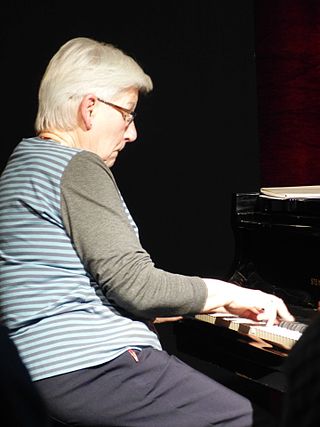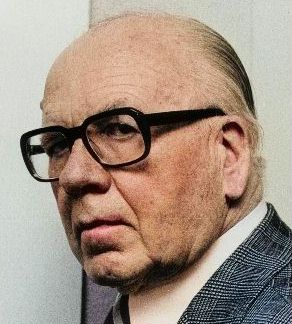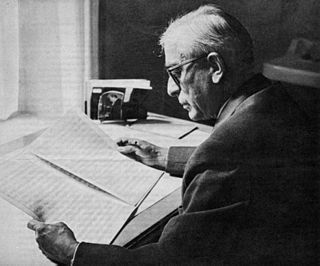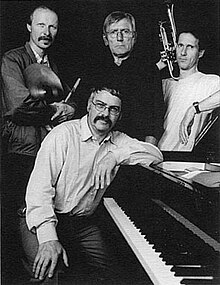Free improvisation or free music is improvised music without any general rules, instead following the intuition of its performers. The term can refer to both a technique—employed by any musician in any genre—and as a recognizable genre of experimental music in its own right.

Winterthur is a city in the canton of Zürich in northern Switzerland. With over 120,000 residents, it is the country's sixth-largest city by population, as well as its ninth-largest agglomeration with about 140,000 inhabitants. Located about 20 kilometres (12 mi) northeast of Zürich, Winterthur is a service and high-tech industrial satellite city within Greater Zürich.

Pancho Haralanov Vladigerov was a Bulgarian composer, pedagogue, and pianist.

Irène Schweizer was a Swiss jazz and free improvising pianist.

Czesław Marek (1891–1985) was a Polish composer, pianist, and piano teacher who settled in Switzerland during World War I.

Rolf Liebermann, was a Swiss composer and music administrator. He served as the Artistic Director of the Hamburg State Opera from 1959 to 1973 and again from 1985 to 1988. He was also Artistic Director of the Paris Opera from 1973 to 1980.
The Orchester Musikkollegium Winterthur is a Swiss symphony orchestra based in Winterthur, Switzerland at its namesake venue, the Musikkollegium Winterthur. The orchestra performs around 60 concerts a year, and in addition to orchestra concerts, performs in the pit at the Zurich Opera.
Musical improvisation is the creative activity of immediate musical composition, which combines performance with communication of emotions and instrumental technique as well as spontaneous response to other musicians. Sometimes musical ideas in improvisation are spontaneous, but may be based on chord changes in classical music and many other kinds of music. One definition is a "performance given extempore without planning or preparation". Another definition is to "play or sing (music) extemporaneously, by inventing variations on a melody or creating new melodies, rhythms and harmonies". Encyclopædia Britannica defines it as "the extemporaneous composition or free performance of a musical passage, usually in a manner conforming to certain stylistic norms but unfettered by the prescriptive features of a specific musical text." Improvisation is often done within a pre-existing harmonic framework or chord progression. Improvisation is a major part of some types of 20th-century music, such as blues, rock music, jazz, and jazz fusion, in which instrumental performers improvise solos, melody lines and accompaniment parts.

Wolfgang Fortner was a German composer, academic composition teacher and conductor.

Conrad Arthur Beck was a Swiss composer.
Simone Keller is a Swiss pianist.

René Wohlhauser is a Swiss composer, pianist, singer, improviser, conductor and music teacher.

Günter Kochan was a German composer. He studied with Boris Blacher and was a master student for composition with Hanns Eisler. From 1967 until his retirement in 1991, he worked as professor for musical composition at the Hochschule für Musik "Hanns Eisler". He taught master classes in composition at the Academy of Music and the Academy of Arts, Berlin. He was also secretary of the Music Section of the Academy of Arts from 1972 to 1974 and vice-president of the Association of Composers and Musicologists of the GDR from 1977 to 1982. Kochan is one of eleven laureates to have been awarded the National Prize of the GDR four times. In addition, he received composition prizes in the US and Eastern Europe. He became internationally known in particular for his Symphonies as well as the cantata Die Asche von Birkenau (1965) and his Music for Orchestra No. 2 (1987). His versatile oeuvre included orchestral works, chamber music, choral works, mass songs and film music and is situated between socialist realism and avant-garde.

Zurich University of the Arts has approximately 2,500 students, which makes it the largest arts university in Switzerland. The university was established in 2007, following the merger between Zurich's School of Art and Design (HGKZ) and the School of Music, Drama, and Dance (HMT). ZHdK is one of four universities affiliated with Zürcher Fachhochschule.

Dominique Girod is a Swiss composer and bassist.

Ulrich Stranz was a German teacher and composer.

Friedrich Schenker was a German avant-garde composer and trombone player.
Robert Heinrich Friedrich Denzler was a Swiss composer and conductor. He was committed to the music of Richard Wagner and contemporary works.

The Bremer Philharmoniker is the official orchestra of the Free Hanseatic City of Bremen. In addition to the music theatre in the Theater Bremen they organise 28 Philharmonic concerts per season, various special, benefit and chamber concerts as well as many projects in the field of music education. Christian Kötter-Lixfeld is the artistic director of the Bremen Philharmonic Orchestra, and Marko Letonja has been its Generalmusikdirektor since the 2018/2019 season.
Hermann Hans Wetzler was a German-American composer.














